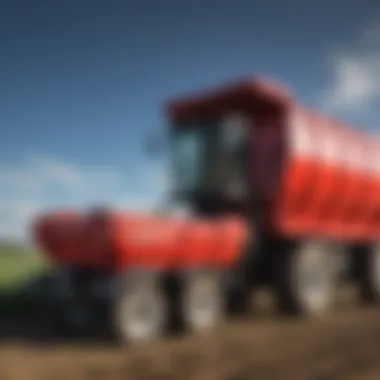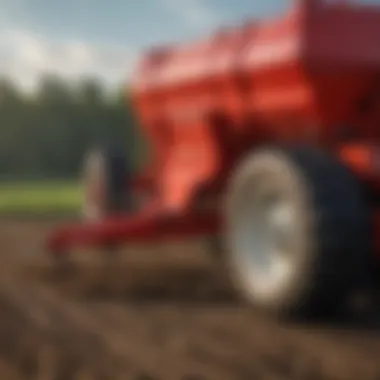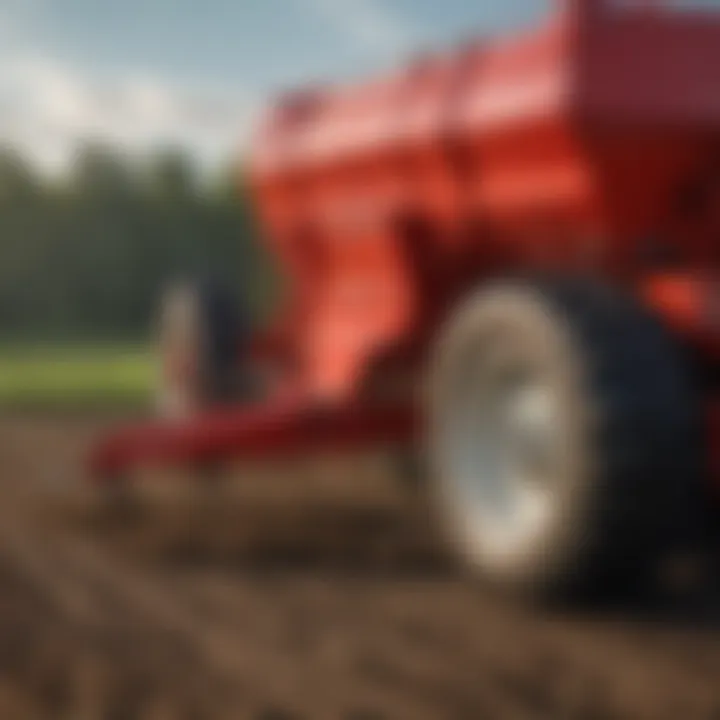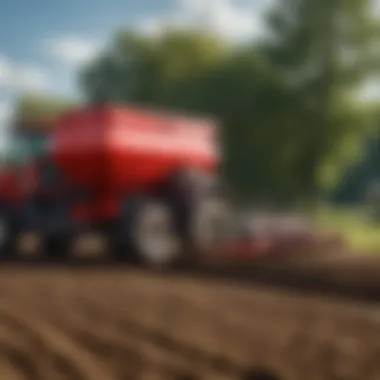Kuhn Knight Truck Mounted Manure Spreaders Overview


Intro
In the realm of modern agriculture, effective nutrient management stands pivotal. Kuhn Knight truck mounted manure spreaders play a crucial role in assisting farmers to apply organic fertilizers efficiently. In this overview, we aim to unravel the significant aspects of these spreaders, covering their design, functionality, advancements, and implications for sustainability in farming practices.
With the rise of environmentally conscious farming, understanding how these machines operate is more important than ever. This article serves as a guide for farmers, researchers, and those interested in agricultural innovations. Here, you will discover how Kuhn Knight manure spreaders fit into the larger context of agricultural tools and sustainability strategies.
Preamble to Kuhn Knight Manure Spreaders
Kuhn Knight manure spreaders are essential tools in modern agricultural practices. They play a vital role in the efficient distribution of manure, which is critical for nutrient management in soils. This introduction focuses on the key aspects of these spreaders and their significance in farming operations.
One of the main benefits of using Kuhn Knight manure spreaders is their ability to enhance soil fertility. By evenly distributing manure, they allow for better nutrient absorption by crops. This is crucial in promoting sustainable farming practices, where maximizing productivity while minimizing environmental impact is a priority.
Kuhn Knight has positioned itself as a leader in this market by constantly innovating its products. The company incorporates advanced technology and engineering principles into its manure spreaders. This results in higher efficiency, reduced waste, and ultimately, better yields for farmers. Whether it is through careful design or user-friendly features, Kuhn Knight ensures its products meet the evolving needs of farmers.
Furthermore, understanding the design and functionality of these spreaders helps users optimize their operations. Knowing how to properly operate and maintain the equipment can lead to significant improvements in performance. Therefore, this article will explore the various aspects of Kuhn Knight truck mounted manure spreaders. It will cover their design features, operational efficiencies, and maintenance requirements among other key areas.
"Efficient manure spreading is crucial for sustainable agriculture and optimal crop yields."
Understanding Truck Mounted Manure Spreaders
Understanding truck mounted manure spreaders is crucial for farmers who aim to improve their operational efficiency. This section examines the definition, purpose, and benefits of these specialized machines. Their role in modern agriculture cannot be understated.
Definition and Purpose
Truck mounted manure spreaders are designed to carry out one main function: spreading manure effectively over farmland. Specifically, they allow for the application of organic fertilizers to enhance soil fertility. These machines are built on truck chassis, providing better mobility compared to traditional spreaders. That means they can reach various fields more quickly without needing a separate tractor.
The primary purpose of these spreaders is to efficiently distribute manure evenly across the field. This ensures that nutrients are available to crops in an optimal manner. By utilizing truck mounted spreaders, farmers can save time and reduce labor costs. The design also minimizes soil compaction since the truck's weight is distributed over a larger area.
Advantages Over Traditional Spreaders
The advantages of truck mounted manure spreaders over traditional methods are significant.
- Increased Efficiency: They cover larger areas in less time. A truck mounted unit can make faster trips between storage and application sites, ultimately enhancing productivity.
- Greater Maneuverability: They can navigate through tight spaces and uneven terrain more easily than towed spreaders.
- Enhanced Capacity: These spreaders typically have higher load capacities, allowing for more manure to be transported in a single trip.
- Reduction in Operational Costs: By improving speed and efficiency, farmers can lower fuel and labor costs.
- Precision Application: Many models now come with technology that aids in precise manure application. This reduces waste and promotes better environmental practices.
Additionally, using truck mounted units allows for better handling of different types of manure. Whether liquid or solid, these machines can adapt, providing flexibility for farmers.
"Truck mounted manure spreaders not only save time but also promote environmental sustainability in farming practices."
Kuhn Knight Product Range
The Kuhn Knight product range represents a significant aspect of the manure spreading equipment landscape. This selection includes a variety of models designed to cater to the diverse needs of modern agricultural practices. By understanding the specifics of the Kuhn Knight offerings, users can better evaluate how these products fit into their operational requirements.
Kuhn Knight manure spreaders are engineered with precision and efficiency. They come in various configurations and capacities, allowing farmers to choose a model tailored to their individual field sizes and manure types. Importance is placed on adaptability since operational conditions can differ widely.
Model Variations
Kuhn Knight offers several model variations, addressing different user requirements. Each model is designed with unique features and operational capabilities, empowering farmers to select the right spreaader for their specific needs. Common models include the Kuhn Knight 8100 and the Kuhn Knight 8200, both known for their reliable performance and robust design.
- Kuhn Knight 8100: This model usually suits smaller to medium-sized farms. It features a lower capacity than the larger models but maintains high operational efficiency. The model is easier to maneuver, making it ideal for tighter fields and less accessible areas.
- Kuhn Knight 8200: This model is geared towards larger operations. With a higher capacity, it allows for increased spreading efficiency, essential for extensive farms. The design focuses on durability, as it often faces more significant operational wear and tear.
The variety within Kuhn Knight's product range assures farmers that there is a model specifically suited to their operational needs.
Specifications Comparison
Comparing specifications across different Kuhn Knight models gives useful insights into their capabilities. Each model has key features that distinguish it from others. Here are some specifications that illustrate their differences:
- Capacity: Varied between models; larger models can hold significantly more manure, impacting spreading frequency.
- Weight: Heavier models provide stability but require more robust towing capacity.
- Spread Width: Wider spread can enhance efficiency and reduce time in the field.
- Hydraulic Options: The availability of hydraulic systems can influence ease of use and operational speed.
For farmers, understanding these specifications is crucial. It helps them to not only maximize their efforts in efficient spreading but also enhances the lifespan of the equipment. Knowing which model provides the specifications that align with their operational scale is an informed approach to investment.
"Kuhn Knight models stand out in the market due to their adaptability and efficiency, making them a preferred choice among progressive farmers."
Overall, the Kuhn Knight product range serves as a comprehensive solution in the manure spreading sector, offering farmers various choices designed to optimize their agricultural practices.
Design Features of Kuhn Knight Spreaders
Design features are vital for the overall performance and effectiveness of manure spreaders. Kuhn Knight's truck mounted manure spreaders embody innovative design principles that enhance usability and operational efficiency. These features are essential not just for the mechanical aspects, but also for improving the user experience and contributing to sustainable agricultural practices.
Construction Materials
Kuhn Knight spreaders utilize high-quality construction materials which are crucial for durability and longevity. The body of these spreaders is typically made from heavy-duty steel, designed to withstand the harsh conditions of agricultural use. This robust material helps to resist corrosion and wear, ensuring that the spreader maintains its structural integrity over years of operation.
Additionally, the use of specialized coatings can enhance the resistance against chemical reactions with manure and fertilizers. This prolongs the life of the spreader while reducing maintenance costs over time.
"Investing in high-quality construction materials translates to lower costs in maintenance and repairs in the long run."


Moreover, the choice of materials impacts the overall weight of the spreader, which can affect the vehicle's payload capacity. Lightweight materials must be balanced against strength to ensure efficient operation.
Innovative Engineering Aspects
Kuhn Knight is known for its innovative engineering in the design of their truck mounted manure spreaders. One significant aspect is the incorporation of advanced distribution technology. The spreaders are engineered to distribute materials uniformly across the field, which is essential for nutrient management. This technology ensures that farmers can achieve optimal fertilizer application rates, which contributes to better crop yields and reduces waste of resources.
Furthermore, these spreaders feature adjustable spreading widths. This allows operators to customize how wide the manure is spread depending on the requirements of their specific operation and field conditions. Such flexibility is crucial in maximizing the efficiency of manure application.
Some models include smart technology that enables real-time monitoring of application rates and amounts. This data-driven approach allows farmers to make informed decisions, optimizing both performance and environmental impact.
In summary, the design features of Kuhn Knight truck mounted manure spreaders combine robust materials with innovative engineering solutions that improve functionality and sustainability. These attributes not only enhance the user experience but also promote responsible farming practices through efficient nutrient management.
Operational Efficiency
Operational efficiency is a critical consideration for any agricultural equipment. For Kuhn Knight truck mounted manure spreaders, this aspect encompasses several key elements. Understanding how operational efficiency influences productivity and cost-effectiveness can help farmers make informed decisions regarding their farming practices.
First, the performance metrics of these spreaders play a significant role in assessing efficiency. The main metrics include throughput rate, even application, and the speed of operation. A higher throughput means much more manure can be spread in a shorter period, significantly reducing labor costs and time spent in the field. Distribution uniformity is also important; uneven spreading can lead to improper nutrient application, affecting crop yields negatively. Therefore, well-designed manure spreaders prioritize a consistent output.
Moreover, the speed at which operators can move between loads contributes to overall efficiency. Efficient operators optimize their time on the field, and equipment that facilitates quick turnaround can enhance this process. In summary, monitoring performance metrics allows farmers to evaluate how well their equipment meets their operational needs.
Performance Metrics
Kuhn Knight manure spreaders are built with various performance metrics in mind. They are designed to ensure a balance between speed and effectiveness. Here are some essential performance metrics:
- Throughput Rate: Measured in tons per hour, it indicates the capacity of the machine to spread manure in given time.
- Spread Width: Wider spreads can cover more area quicker, reducing the number of passes needed.
- Application Consistency: Advanced designs help maintain even distribution, critical for nutrient management.
The agprespective is essential. The more producers can measure these metrics, the better they can assess the operational effectiveness of their spreaders.
User-Friendly Features
Another aspect vital to operational efficiency is the user-friendly features of Kuhn Knight truck mounted manure spreaders. These features ensure that operators can maintain efficient workflows while minimizing fatigue and the potential for operational errors.
Several user-friendly features are typical in Kuhn Knight spreaders:
- Intuitive Design: Simple controls and easy-to-read displays make it easier for operators to monitor performance.
- Adjustable Settings: Users can modify spread patterns on-the-go, adapting to varying field conditions.
- Integrated Safety Features: Automatic shutoff systems prevent overloading and operational mishaps.
With these features, farmers can focus on the task at hand while still ensuring they get the most from their equipment. As a result, the overall operational efficiency of the septic service is significantly enhanced, aligning with modern farming principles.
Maintenance and Care
Maintaining Kuhn Knight truck mounted manure spreaders is essential for ensuring their longevity and optimal performance. Proper care not only enhances efficiency but also minimizes operational disruptions that can impact farming operations. To sustain productivity, it is crucial to follow systematic maintenance protocols and address issues promptly. This section delves into routine maintenance guidelines and common troubleshooting techniques.
Routine Maintenance Guidelines
Routine maintenance is vital to keep the machines functioning smoothly. Following these guidelines helps mitigate wear and tear:
- Daily Inspection: Before use, perform a thorough inspection of the spreader. Check for any signs of abnormal wear, loose bolts, or damaged components. Pay special attention to the belts and chains.
- Cleaning: After each use, clean out any remaining manure to prevent build-up. This can lead to corrosion or damage to the spreader’s body.
- Lubrication: Ensure that all moving parts are well-lubricated. Use manufacturer-approved lubricants to reduce friction and extend component life.
- Fluid Levels: Regularly check fluid levels, including hydraulic oil and coolant. Maintaining these at optimal levels is crucial for consistent performance.
- Storage Conditions: When not in use, store the spreader in a dry and sheltered location. This protects it from weather-related damage, especially during harsh winters.
By adhering to these maintenance practices, users can significantly enhance the lifespan and reliability of their Kuhn Knight manure spreaders.
Troubleshooting Common Issues
Despite regular maintenance, users may face some challenges with their spreaders. Identifying problems early can save time and resources. Here are some common issues and their possible solutions:
- Uneven Distribution: If the manure is not spreading evenly, check the calibration settings. Adjusting the spreader’s flow rate may also help achieve better distribution.
- Mechanical Failures: Listen for unusual sounds during operation. If grinding or knocking noises occur, inspect the gearboxes and belt drives for damage or misalignment.
- Hydraulic Problems: Insufficient power or slow movements might indicate a hydraulic issue. Examine hoses for leaks and ensure that the hydraulic fluid is at the correct level. If problems persist, it may be necessary to consult with a technician.
- High Wear Areas: Parts that see the most use, like augers and spinners, may wear out faster. If these components show significant wear, consider replacing them to maintain performance.
Staying attentive to these common issues can ease troubleshooting and enhance overall operational efficiency.
Remember: Regular maintenance and proactive troubleshooting are key in preventing costly repairs and ensuring the effectiveness of your manure spreader.
Nutrient Management
Nutrient management plays a crucial role in modern agriculture. It directly influences soil health and crop yields. The balanced application of nutrients through manure spreaders, like those from Kuhn Knight, ensures that plants receive the essential elements they need for growth. This section discusses its significance and effective practices.
Importance in Soil Health
Soil health is a vital aspect of sustainable farming practices. Healthy soil can enhance crop productivity and resilience to pests and diseases. Nutrient management contributes several benefits:
- Improves Soil Structure: Properly managed nutrients help maintain soil integrity, which promotes aeration and water retention.
- Increases Microbial Activity: A balanced nutrient supply fosters a diverse microbial community, essential for nutrient cycling.
- Enhances Nutrient Availability: Site-specific applications of manure ensure that the soil retains and properly utilizes nutrients.
Regular assessment and knowledge of soil nutrient status can prevent over-application, which can lead to nutrient runoff and pollution. This is particularly important when using products like the Kuhn Knight manure spreaders, which can deliver precise amounts of manure based on soil needs. Overall, a focus on soil health through proper nutrient management can lead to better crop yields and healthier ecosystems.
Best Practices for Application
Effective manure application is critical to optimizing nutrient management. Following best practices can enhance both the efficiency and the environmental safety of manure use. Key recommendations include:


- Precision Application: Utilize technologies such as GPS to apply manure exactly where needed, avoiding over-application.
- Timing: Apply manure near the time when crops need nutrients, promoting maximum uptake and minimizing losses.
- Incorporation: Integrating manure into the soil soon after application reduces nutrient loss and enhances soil absorption.
Regular monitoring and adapting your application strategy are essential in maximizing the benefits of nutrient management.
By adhering to these practices, farmers can ensure that the functionality of Kuhn Knight manure spreaders is optimized. This leads to an effective use of nutrients, better soil health, and ultimately, improved agricultural outputs.
Sustainability Considerations
Sustainability is a pivotal aspect to address when discussing Kuhn Knight truck mounted manure spreaders. This equipment not only plays a crucial role in modern agriculture practices but also significantly impacts environmental integrity and adherence to emerging regulations. Understanding sustainability involves recognizing the interconnectedness of agricultural productivity, environmental health, and community well-being. As farmers strive to maintain their output, there's an increasing awareness of the necessity to minimize ecological footprints.
Sustainable manure management practices help maximize nutrient recycling and reduce reliance on synthetic fertilizers, which can lead to improved soil quality and plant health. Implementing Kuhn Knight spreaders promotes both efficient nutrient management and environmental stewardship. This approach aligns with modern agricultural goals aimed at enhancing productivity while ensuring long-term viability of agricultural ecosystems.
Environmental Impact
The environmental impact of manure application is profound. Conveniently, Kuhn Knight truck mounted manure spreaders are designed with features that mitigate negative ecological consequences. Firstly, they ensure precise and uniform distribution of manure across fields, reducing the risk of over-application. This precision limits nutrient runoff into nearby waterways, preventing issues such as eutrophication, a process that depletes oxygen in water bodies and harms aquatic life.
Moreover, these spreaders are often constructed using materials and technologies that reduce emissions during operation. By contributing to improved soil health, these machines can foster biodiversity both above and below ground. Healthy soils can sequester carbon, thus playing a role in climate change mitigation.
"Kuhn Knight spreaders enable farmers to utilize manure as a resource, promoting a closed-loop system that benefits both agriculture and the environment."
Regulatory Compliance
Regulatory compliance is another critical element in the discussion of sustainability in agriculture. Farmers utilizing Kuhn Knight manure spreaders are likely to find that these machines help them meet various local and national regulations concerning nutrient management and environmental protection.
Governments often establish stringent guidelines to regulate nutrient application rates and timing to protect water quality. Kuhn Knight spreaders facilitate adherence to such policies by ensuring accurate application rates and efficient nutrient use. This, in turn, helps to avoid potential legal liabilities and penalties associated with non-compliance.
Additionally, many regions are implementing incentive programs for sustainable practices that offer financial benefits for using innovative equipment like truck mounted manure spreaders. Farmers can navigate these regulatory waters more effectively when they deploy technology that aligns with best practice standards.
In summary, the sustainability considerations surrounding Kuhn Knight manure spreaders not only enhance agricultural productivity but also align with principles of environmental stewardship and regulatory compliance. Such integration leads to a more responsible and efficient approach to modern farming.
Comparative Analysis
The comparative analysis of Kuhn Knight truck mounted manure spreaders plays a crucial role in understanding their place in the agricultural equipment market. This section focuses on how these spreaders stack up against competitors and how they are positioned within the industry. Analyzing these elements helps farmers and agricultural professionals make informed decisions when considering equipment that influences productivity, efficiency, and the overall sustainability of their operations.
Kuhn Knight vs. Competitors
When assessing Kuhn Knight spreaders against competitors like Ag Leader Technology and Landoll, it's essential to highlight several key factors:
- Design and Build Quality: Kuhn Knight spreaders are often praised for their robust construction. They utilize high-quality materials that enhance durability compared to some competitors. This results in a longer lifespan and lower maintenance costs.
- Operational Efficiency: Kuhn Knight's technology enhances the efficiency of manure spreading. Features like precise application rates and advanced hydraulic systems allow for better control and reduced waste. This can be a considerable advantage over rival brands which may not offer similar features.
- User Experience: User-friendliness is vital. Kuhn Knight focuses on designing controls that are intuitive. This approach contrasts with other brands where users might struggle with complex systems, leading to less effective operation.
- After-Sales Support: Farmers often cite the importance of good customer service. Kuhn Knight generally offers better after-sales support, which includes parts availability and technical assistance compared to some competitors.
In summary, while many brands provide effective agricultural solutions, Kuhn Knight's blend of durability, efficiency, and support sets them apart in the market.
Market Positioning
Kuhn Knight is strategically placed in the market as a reliable choice for farmers. Their focus on quality and performance aligns well with industry demands, and they recognize the importance of sustainability amid growing environmental concerns.
- Target Audience: The target audience includes larger farms and agricultural enterprises that require efficient and reliable manure spreading. These users often prioritize high-capacity equipment that can handle significant volumes.
- Competitive Pricing: While not the cheapest option available, Kuhn Knight spreaders offer a favorable cost-to-benefit ratio. This positions them well within the mid-to-high market segment, appealing to those willing to invest in quality for better returns.
- Brand Reputation: Over the years, Kuhn Knight has built a reputable brand image based on its commitment to innovation and customer satisfaction. This reputation aids in attracting new customers while retaining existing ones.
"Brand loyalty hinges on consistent performance and quality. Kuhn Knight has managed to sustain this over the years, making it a preferred choice for discerning farmers."
Emerging Technologies in Manure Spreading
Emerging technologies in manure spreading represent a significant shift in farming practices. These advancements enhance efficiency, sustainability, and precision in nutrient application. The current agricultural landscape recognizes the imperative of optimizing manure management systems. As environmental regulations tighten, the implementation of modern technology becomes increasingly important for compliance and improved farm productivity.
Automation and Smart Farming
Automation in manure spreading is providing farmers with tools that simplify the application process. Smart farming practices leverage technology to monitor and control spreading operations in real-time. For example, automated systems can adapt the spreading rate based on soil condition and crop requirements. This reduces waste and ensures that nutrients are applied when and where they are most needed.
- Benefits of Automation
- Increased accuracy in application rates
- Reduction in labor costs and time
- Minimization of nutrient runoff
Autonomous manure spreaders can communicate with other equipment, leading to enhanced workflow on the farm. These integrated systems make the entire process more efficient and responsive to changing conditions. This adaptive approach also promotes better soil health and higher crop yields.
Data-Driven Decision Making
Data-driven decision-making in manure application allows farmers to utilize data analytics for informed choices. By collecting and analyzing data on nutrient levels, soil health, and crop requirements, farmers can tailor their spreading strategies. This leads to more effective use of resources and improved sustainability.
Having access to real-time data means that farmers can:
- Track nutrient application rates
- Schedule spreading at optimal times
- Analyze the impact of previous applications on crop health
Implementing data analytics in manure spreading not only aids in maximizing input efficiency but also assists in maintaining regulatory compliance. Additionally, it fosters an environment of continuous improvement within farm operations. The underlying principle is to make every decision based on concrete evidence, ultimately leading to better harvest outcomes.
Case Studies


Case studies play a crucial role in evaluating the effectiveness and reliability of Kuhn Knight truck mounted manure spreaders. They provide real-world insights into how these machines perform under various conditions and their impact on the farming community. Analyzing practical examples allows farmers and industry professionals to understand the true capabilities and benefits of these spreaders.
Successful Implementations
Successful implementations of Kuhn Knight manure spreaders illustrate their ability to enhance operational efficiency. For instance, several farms in the Midwest have reported significant improvements in nutrient application consistency when utilizing these spreaders.
One case involves a dairy farm that switched to a Kuhn Knight spreader to manage their manure. Before this change, the farm faced challenges with uneven distribution, leading to nutrient loss and soil degradation. After adopting the Kuhn Knight spreader, the owner noted a marked increase in crop yield and healthier soil.
The feedback from farmers highlights several specific advantages:
- Uniformity: The design ensures a consistent spreading pattern.
- Efficiency: Reduces the time required for manure application.
- Soil Health: Positive impact on nutrient retention in the soil.
These implementations demonstrate not just the effectiveness of the equipment, but also how they correlate with sustainable farming practices.
Testimonials from Users
User testimonials provide valuable perspectives on the practicalities of using Kuhn Knight manure spreaders. Farmers who have adopted these machines often share their experiences, which can guide others in making informed decisions.
One testimonial from a farmer in Florida stated, _"The Kuhn Knight spreader changed how we manage our manure. It's straightforward to operate and provides even distribution, which has made a real difference in our crop health."
Positive feedback generally emphasizes:
- Durability: Users report that the machines withstand harsh conditions over extended periods.
- Ease of Use: Farmers appreciate the user-friendly controls and operational simplicity.
- Performance: Many users note enhanced performance compared to traditional methods.
These insights are vital for potential buyers. They offer more than just product specifications; they reveal the true value delivered by Kuhn Knight's offerings in the field.
Future Trends in Manure Spreaders
As the agricultural landscape continues to evolve, understanding the future trends in manure spreaders becomes crucial for farmers and agricultural enthusiasts. The integration of technology and innovation shapes these trends, impacting how manure is managed and applied in the field. Kuhn Knight truck mounted manure spreaders are at the forefront of these developments, aligning with industry needs for efficiency, sustainability, and cost-effectiveness.
Industry Innovations
Recent advancements in manure spreading technology emphasize precision and automation. Innovations like variable rate application and GPS-guided spreading systems are becoming popular. These features allow for targeted nutrient application, which minimizes waste and maximizes efficiency. For instance, madifying the settings based on soil nutrient levels helps to improve overall soil health. Data analytics also plays a role, enabling farmers to make informed decisions based on real-time information.
Another significant trend involves the use of eco-friendly construction materials and designs that reduce the environmental impact of manure spreading. Manufacturers are focusing on creating spreaders that not only perform well but also meet sustainability standards. Moreover, developments in aerodynamics and technology like hydraulic drives make spreaders easier to use, contributing to improved user experience.
Predicted Market Changes
The manure spreading market is likely to see considerable shifts in the coming years. With increasing awareness of environmental stewardship, there is a push for equipment that aligns with sustainable practices. Farmers are more inclined towards technology that offers efficiency while adhering to regulations regarding nutrient management.
Consumer demand is pushing manufacturers like Kuhn Knight to innovate continually. This includes developing models that are compatible with electric vehicles or hybrid systems, responding to the broader trends of reducing fossil fuel dependence in agriculture.
From economic factors, market dynamics will also play a role. Prices of raw materials may impact manufacturing costs, affecting how competitive products are priced. As such, staying informed about these market trends becomes essential for farmers looking to optimize their operations.
The evolution of manure spreaders from traditional methods to advanced technological solutions denotes a significant shift in agricultural practices. Keeping abreast of these changes will empower farmers to make strategic decisions.
End
In this article, we have explored the multifaceted realm of Kuhn Knight truck mounted manure spreaders. The significance of this topic extends beyond mere machinery; it encompasses critical aspects of agricultural efficiency, sustainability, and economic viability.
Understanding the operational capabilities of these spreaders is vital for farmers looking to enhance productivity. The advanced design and engineering choices made by Kuhn Knight allow for a more effective nutrient distribution, which translates into healthier soil and better crop yields. The integration of innovative features not only ensures ease of use but also minimizes maintenance needs, further supporting a streamlined farming operation.
"The advancement of manure spreading technology is a key driver in modern agricultural practices, promoting sustainable methods that benefit both farmers and the environment."
Additionally, as we have discussed, the importance of sustainability in modern agriculture cannot be understated. Kuhn Knight spreaders are designed with environmental considerations in mind, demonstrating how equipment can positively impact farm management while also addressing regulatory compliance.
The article emphasizes trends such as automation and data-driven decision making which are shaping the future of manure spreading. Farmers who adapt to these technologies will likely find themselves at a competitive advantage in the market.
To summarize, recognizing the full potential and advantages of Kuhn Knight truck mounted manure spreaders is crucial in today’s agricultural landscape. This knowledge not only aids in effective nutrient management but also contributes to sustainable farming practices that are increasingly vital in addressing ecological challenges.
References and Further Reading
When exploring the comprehensive overview of Kuhn Knight truck mounted manure spreaders, having access to reliable information sources becomes crucial. References and further reading provide the necessary context and depth to understand the advances and applications of these heavy-duty agricultural tools. Key areas include technical specifications, case studies, user experiences, and sustainability practices associated with manure spreading.
Importance of References
- Validated Information: It ensures that the facts and features of Kuhn Knight products are accurate and aligned with the latest industry standards.
- Broader Context: Reading various sources can give insights into industry trends, regional practices, and the competitive landscape surrounding manure management equipment.
- Educational Resource: Farmer practitioners and enthusiasts can learn from the experiences and testimonials shared by users. This can greatly influence purchasing or operational decisions.
Recommended Reading List
- Kuhn Official Website: Deep dives into models and specifications. Relevant for the most current product offerings.
- Agricultural Resources at Britannica: Comprehensive articles on manure spreading technology and its environmental impacts. An excellent resource for foundational knowledge.
- Reddit Agricultural Communities: Discussions and firsthand experiences from fellow farmers and agriculturalists. Engaging with these communities provides both practical advice and anecdotal evidence.
- Wikipedia: A generic overview of manure spreaders and their significance in modern agriculture. Useful for understanding the broader historical context.
"In the realm of agriculture, staying updated with current technologies like Kuhn Knight is essential for effective farming practices. Learning from various resources ensures informed decision-making."
Benefits of Further Reading
Understanding the operation and features of a Kuhn Knight manure spreader does not stop at the initial purchase or setup. Continuous engagement with related literature helps in the following ways:
- Optimal Use: By studying best practices and maintenance tips, users can enhance the efficiency and longevity of their equipment.
- Technological Advancements: Keeping abreast of emerging technologies enables farmers to decide when and how to integrate new innovations into their operations.
- Policy Compliance: Knowledge of sustainability regulations and environmental impact will help ensure that operations align with legal requirements, minimizing risks associated with manure spreading.
In summary, utilizing references and further reading enhances the understanding and effective application of Kuhn Knight truck mounted manure spreaders. The insights gained not only improve operational efficiencies but also contribute to sustainable farming practices.



